 "Madcap hilarity ensues" has to be one of Lulu's most favorite phrases. Just toss out the set-up of a comedy and then conclude with "madcap hilarity ensues," thereby distill all the internecine twisty turns of comic plotting into a simple summary that tells everyone what they most need to know. An example? A swinging single guy wants to share an apartment with two sexy ladies, so he tells the nosy landlord he's a homo; madcap hilarity ensues. Another? A somewhat frumpy young woman takes a job at the center of the fashion universe and? Madcap hilarity ensues (with some life lessons learned along the way: Exhibits A & B). A third? The dimwitted, ne'er-do-well son of a former president somehow gets elected to the presidency at a crucial juncture in the nation's history and madcap hilar -- no wait, that's not funny at all. (See, it's a thin thin line separating comedy from tragedy.) Anyway...
"Madcap hilarity ensues" has to be one of Lulu's most favorite phrases. Just toss out the set-up of a comedy and then conclude with "madcap hilarity ensues," thereby distill all the internecine twisty turns of comic plotting into a simple summary that tells everyone what they most need to know. An example? A swinging single guy wants to share an apartment with two sexy ladies, so he tells the nosy landlord he's a homo; madcap hilarity ensues. Another? A somewhat frumpy young woman takes a job at the center of the fashion universe and? Madcap hilarity ensues (with some life lessons learned along the way: Exhibits A & B). A third? The dimwitted, ne'er-do-well son of a former president somehow gets elected to the presidency at a crucial juncture in the nation's history and madcap hilar -- no wait, that's not funny at all. (See, it's a thin thin line separating comedy from tragedy.) Anyway..."Madcap hilarity ensues" is a phrase that actually emerged in descriptions of the "screwball" comedies of the 1930s, a classic example of which just happens to finally bring StinkyLulu's first Supporting Actress profile for the month of September...
approximately 41 minutes "on" screen (including 1.5 minute "buzzing" scene)
10 scenes
46% of film's total screen time
10 scenes
46% of film's total screen time
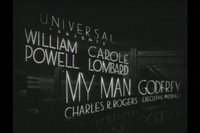 The basic set-up of the beloved My Man Godfrey is this: At the height of the Great Depression, a pair of intensely competitve, obscenely wealthy sisters encounter an enigmatic homeless man while playing a faddish game. The sillier sister hires the man to be her new butler/protege and...madcap hilarity ensues.
The basic set-up of the beloved My Man Godfrey is this: At the height of the Great Depression, a pair of intensely competitve, obscenely wealthy sisters encounter an enigmatic homeless man while playing a faddish game. The sillier sister hires the man to be her new butler/protege and...madcap hilarity ensues. 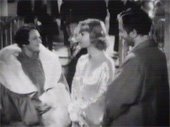 (Supporting Actress nominee Alice Brady makes her first appearance as the girls' mother -- fluttery society matron Angelica Bullock -- about 7 minutes along in the film, precisely at the point in the narrative where said "madcap hilarity" begins ensuing.) The man Godfrey (William Powell, who glides through the role with enthralling ease; neither glib nor plummy, Powell's performance is the height of intelligent 1930s elegance) ends up doing much more than "buttling" for the Bullocks; he changes their lives forever. (Cue music swell.) 70 years later, movie audiences have seen this story a thousand times, told better and (mostly) worse.
(Supporting Actress nominee Alice Brady makes her first appearance as the girls' mother -- fluttery society matron Angelica Bullock -- about 7 minutes along in the film, precisely at the point in the narrative where said "madcap hilarity" begins ensuing.) The man Godfrey (William Powell, who glides through the role with enthralling ease; neither glib nor plummy, Powell's performance is the height of intelligent 1930s elegance) ends up doing much more than "buttling" for the Bullocks; he changes their lives forever. (Cue music swell.) 70 years later, movie audiences have seen this story a thousand times, told better and (mostly) worse.  But it's worth remembering that not only did My Man Godfrey establish this formula for the Hollywood factory but there's a sparkle to it which goes well beyond that formula and which makes My Man Godfrey a deservedly beloved Hollywood classic. (A word of caution: do try to find the Criterion version for your screening, lovely reader; there are a whole bunch of awful low-rent transfers out there on dvd -- like the one Lulu screened -- and the sound clarity really suffers. Be on particular alert for the evil colorized version...)
But it's worth remembering that not only did My Man Godfrey establish this formula for the Hollywood factory but there's a sparkle to it which goes well beyond that formula and which makes My Man Godfrey a deservedly beloved Hollywood classic. (A word of caution: do try to find the Criterion version for your screening, lovely reader; there are a whole bunch of awful low-rent transfers out there on dvd -- like the one Lulu screened -- and the sound clarity really suffers. Be on particular alert for the evil colorized version...)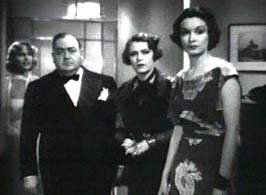 Now, to the actressing at the edges. There are three Supporting Actresses in Godfrey: the nominated Alice Brady as the dotty society mama, the zingy Jean Dixon as the Molly the maid and the magnetic Gail Patrick as the "other" sister. (Perhaps unsurprisingly, Oscar picked the least interesting of the three to nominate; Lulu, of course, woulda picked Dixon.) But Brady's Mrs. Angelica Bullock definitely emerges as the wackiest of the three parts.
Now, to the actressing at the edges. There are three Supporting Actresses in Godfrey: the nominated Alice Brady as the dotty society mama, the zingy Jean Dixon as the Molly the maid and the magnetic Gail Patrick as the "other" sister. (Perhaps unsurprisingly, Oscar picked the least interesting of the three to nominate; Lulu, of course, woulda picked Dixon.) But Brady's Mrs. Angelica Bullock definitely emerges as the wackiest of the three parts. 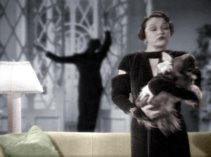 Part concerned mother, part indulged wife, mostly self-obsessed rich lady, Brady's Angelica has all the accessories of absurd wealth. Crazy gowns. Idiotic dogs. And an entourage of one, Carlo -- ostensibly a serious musician, certainly a parasite, possibly a "walker" -- who eats a lot and sometimes seems as much her pet as her protege.
Part concerned mother, part indulged wife, mostly self-obsessed rich lady, Brady's Angelica has all the accessories of absurd wealth. Crazy gowns. Idiotic dogs. And an entourage of one, Carlo -- ostensibly a serious musician, certainly a parasite, possibly a "walker" -- who eats a lot and sometimes seems as much her pet as her protege.But Oscar demonstrated what would become some familiar tics in acknowledging Alice Brady with this nomination (& in the handful of remaining years before Brady's death from cancer in 1939). Most essentially, Alice Brady was an accomplished stage actress (consider her accolades for her performance as Lavinia in the orginal 1931 NY production of Mourning Becomes Electra, a doozy of a non-comedic role) who was also one of the few reliable silent players to make the transition to sound relatively easily. Indeed, it's interesting that Oscar noted Brady's performance as Angelica Bullock, which finally gave voice to the dotty society matron role for which Brady was most known during the silent era. Indeed, it's as Angelica Bullock that Alice Brady created a sound version of her silent signature role...
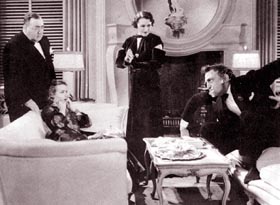 See, in Godfrey, Brady's Angelica Bullock is portrayed as the apex of irrelevance and the camera knows it. Most of Brady's scenes end as she's still talking, even as the camera has followed someone else to another room/scene. Often, major scenes happen around or adjacent to Brady's Angelica, who does little more than punctuate things with breezily absurd non-sequiturs. Notably, Brady mostly crafts Angelica through this vocality: her Mrs. Bullock is warbly, chattery and (not infrequently) nearly unintelligible. But, even if no one's really listening, every time Brady's Angelica chirps, the sound resounds. Alice Brady's there; ya just can't miss her.
See, in Godfrey, Brady's Angelica Bullock is portrayed as the apex of irrelevance and the camera knows it. Most of Brady's scenes end as she's still talking, even as the camera has followed someone else to another room/scene. Often, major scenes happen around or adjacent to Brady's Angelica, who does little more than punctuate things with breezily absurd non-sequiturs. Notably, Brady mostly crafts Angelica through this vocality: her Mrs. Bullock is warbly, chattery and (not infrequently) nearly unintelligible. But, even if no one's really listening, every time Brady's Angelica chirps, the sound resounds. Alice Brady's there; ya just can't miss her.And even though StinkyLulu's not too too fond of the performance (a malaise certainly cultivated by years upon years of Brady's warbly shrillness being the stock vocal choice for actresses portraying matrons of a certain tax bracket), StinkyLulu must confess: Brady's Angelica has one of the best last lines in all of cinema. The Bullock household's in an uproar. Her husband's literally thrown Carlo out. Godfrey's not Godfrey but another Godfrey entirely. Her family rushes off to resolve matters far beyond her comprehension. Even the camera leaves her. And what do we hear?
"And Carlo's gone out of the window. Everybody's gone."There's no rational reason why this little line should give Lulu's little heart such an afterglow, but, hey, that's the nature of madcap hilarity: it ensues.
Tune in soon for more Supporting Actress madness, lovely reader.
Being away last weekend threw things off a touch, but things'll be back on track this week... Possibly even this Wednesday...
Being away last weekend threw things off a touch, but things'll be back on track this week... Possibly even this Wednesday...

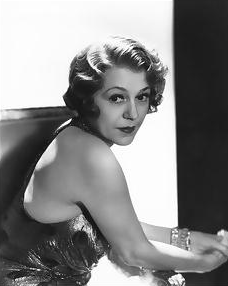
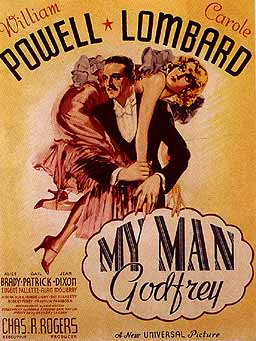
No comments:
Post a Comment